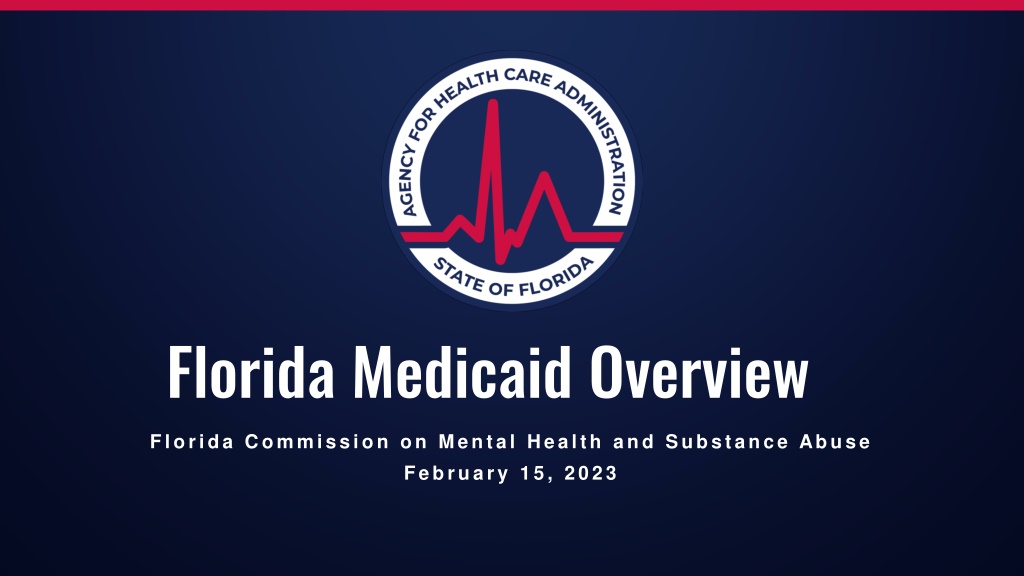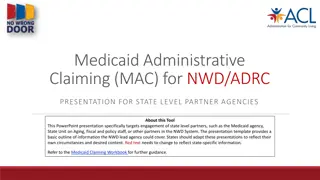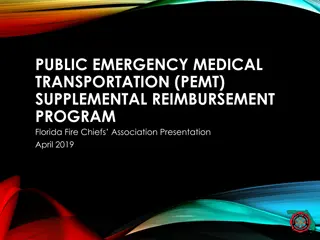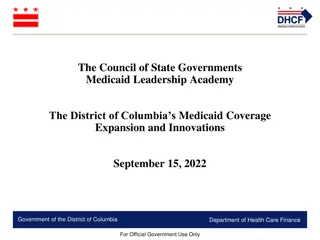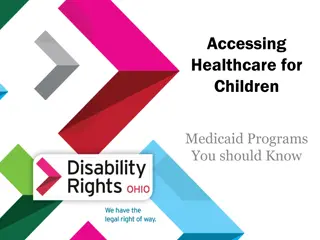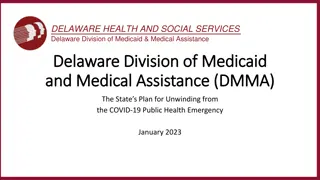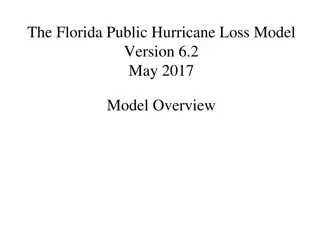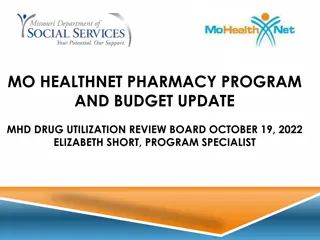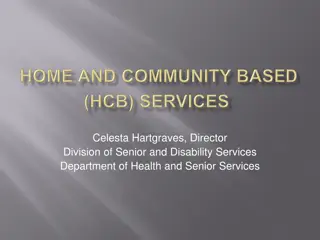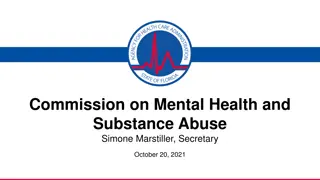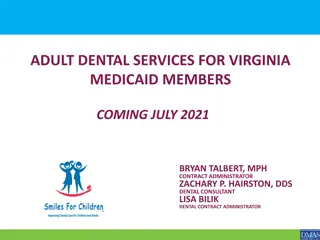Florida Medicaid Overview
Florida Medicaid is a crucial program providing health care coverage to low-income individuals in the state. The program is administered by the Florida Commission on Mental Health and Substance Abuse, overseeing core functions to ensure high-quality care, transparency, and cost-effectiveness. Medicaid operates under federal guidelines, with mandatory and optional coverage groups defined by Congress and the Department of Health and Human Services. The program serves millions of Floridians and plays a vital role in enhancing health outcomes and promoting access to care.
Download Presentation

Please find below an Image/Link to download the presentation.
The content on the website is provided AS IS for your information and personal use only. It may not be sold, licensed, or shared on other websites without obtaining consent from the author. Download presentation by click this link. If you encounter any issues during the download, it is possible that the publisher has removed the file from their server.
E N D
Presentation Transcript
Florida Medicaid Overview Florida Commission on Mental Health and Substance Abuse February 15, 2023
Agency Overview MISSION Better Health Care for all Floridians CORE FUNCTIONS - State s Chief Health Policy and Planning Entity - Administering the Florida Medicaid Program - Licensure and Regulation of nearly 50,000 health care facilities We leverage technology to support these core functions and all agency operations. 2 2
Agency Objectives ONE AHCA We are one agency, one team. COST EFFECTIVE We leverage Florida s buying power in delivering high quality care at the lowest cost to taxpayers. TRANSPARENT We support initiatives that promote transparency and empower consumers in making well informed healthcare decisions. HIGH QUALITY We emphasize quality in all that we do to improve health outcomes, always putting the individual first. 3 3
Core Functions Administration of Florida s Medicaid Program Responsible for administering the state s $37.6 billion Medicaid Program that serves more than 5.5 million population Health Care Regulation and Transparency Responsible for the licensure and/or certification of the states 50,000 plus health care facilities and the sharing of health care data through the Florida Center for Health Information and Policy Analysis 4 4
What is Medicaid? Medicaid is a federal program through which states partner with the federal government to provide health care coverage to low-income children, families, elders, and people with disabilities. Each state develops a unique Medicaid program based on federal rules subject to federal Centers for Medicare and Medicaid Services (CMS) approval. 5 5
What is Medicaid? Congress and the federal government, through the Department of Health and Human Services (DHHS), set basic mandatory requirements for all state Medicaid programs, these include: Administrative requirements for states Minimum coverage populations and services Rules for receipt of federal matching funds 6 6
Mandatory and Optional Medicaid Groups The federal government requires state Medicaid programs to cover mandatory groups and allows for coverage of optional groups. Mandatory groups: Categories of people that must be covered. Optional groups: States may choose to cover additional federally approved groups. State Medicaid programs outline covered groups through their Medicaid state plan and various waivers. 7 7
Mandatory and Optional Medicaid Services The federal government requires state Medicaid programs to cover mandatory services and allows for coverage of optional services. Mandatory services: Categories of health care benefits that must be covered. Optional services: States may choose to cover additional federally approved health care benefit. State must cover mandatory services if federal matching funds are to be received. States may also receive Federal matching funds to provide certain optional services. State Medicaid programs outline covered services through their Medicaid state plan and various waivers. 8 8
Mandatory and Optional Medicaid Services Mandatory Services include the following: Optional Medicaid Services Can Include: Inpatient/ Outpatient Hospital Laboratory and X-ray Adult Preventive Services Durable Medical Equipment & Prosthetic Devices Nursing Facility Family Planning Diagnostic Rehabilitation and Physical Therapy Services Home Health Nurse Midwife Physician Certified Pediatric and Family Nurse Practitioner Clinic Nursing Facility Services for Children under Age 21 Rural Health Clinic Freestanding Birth Center Intermediate Care Facility Home and Community-Based Care to Certain Persons with Chronic Impairments Federally Qualified Health Center Transportation to Medical Care Tobacco Cessation Counseling for Pregnant Women Early and Periodic Screening, Diagnostic, and Treatment Services for Children (EPSDT) Prescribed Drugs Targeted Case Management Services Hospice Care Podiatry 9 9
Federal Authorization of State Medicaid Programs Each state is required to have a Medicaid State Plan, approved by the federal Centers for Medicare and Medicaid Services (CMS), which establishes the basis of that state s Medicaid program. State Plan must: designate a single state Medicaid agency establish eligibility standards determine benefits and services set payment rates Services must be available statewide in the same amount, duration and scope. This is what makes Medicaid an entitlement program. Anyone eligible to receive the services outlined in the State Plan is entitled to services. States cannot put an overall limit on state plan services, either by capping the number of people who can receive the services or by capping the total amount of dollars the state will spend on the service. 10 10
Federal Authorization of State Medicaid Programs Once federal mandatory minimum requirements are met, each state: Develops its own programs Develops and operates its own state plan Establishes its own eligibility standards Determines the type, amount, duration and scope of services Develops cost sharing requirements Sets the rate of payment for services 11 11
Federal Authorization of State Medicaid Programs In order for states to implement programs which deviate from their State Plan (to vary by geographic areas, amount, duration and scope), the state must request a waiver. How do states define their OWN Medicaid programs? A waiver is a program, requested by a state and approved by CMS, that waives certain provisions of the Social Security Act. Certain federal laws are waived . Waivers are vehicles states can use to test new or existing ways to deliver and pay for health care services in their Medicaid program. 12 12
State Medicaid Program Delivery Systems How do Medicaid programs deliver services to recipients? The Federal Medicaid program allows states to choose from a number of different systems through which to deliver Medicaid services to their Medicaid recipients. The two main types of delivery systems are: Fee-for-Service Managed Care *Many state Medicaid programs have a combination of both systems. 13 13
Delivery System: Fee-for-Service In this delivery system, health care providers are paid for each service (like an office visit, test, or procedure). Payments are made directly to individual providers by the state Medicaid program. Providers do not bear any financial risk for their patients. Fee-for-Service recipients may receive services from any enrolled Medicaid provider with limited coordination of care. Within the Fee-for-Service system, enrolled Medicaid providers have the option to choose whether they accept a certain number of clients or whether they accept new Medicaid clients. 14 14
Delivery System: Managed Care Managed Care is when health care organizations/health plans manage how their enrollees receive health care services. For Medicaid programs, the state will contract with the health care organization/health plan to provide Medicaid services to the recipient. The Managed Care Organization will contract with a variety of health care providers in order to provide health care services to the recipients. Managed Care may employ provider network management, utilization management, and quality assurance. 15 15
Delivery System: Managed Care Health plans may be paid through a capitated arrangement where the health plan receives a per member per month reimbursement to provide all covered medical services to its members. Under Managed Care, the health care organization/health plan may be at risk : This means, we pay a fixed price that covers all (or nearly all) the services a plan provides. If the plan spends more than that, they lose money. If the plan spends less than that, they make money. 16 16
The Florida Medicaid Program Medicaid serves more than 5.6 million Floridians. Adults - parents, elderly, and disabled Over 2.6 million 54% Children in Florida Birth deliveries in Florida (CY 2020) 54.24% 60.26% Nursing home days in Florida 17 17
The Florida Medicaid Program A majority of Florida s Medicaid Population receives Medicaid services through a managed care delivery system, called the Statewide Medicaid Managed Care program (SMMC). FFS 21.46% Managed Care 78.54% Statewide Medicaid Managed Care (SMMC) Program Implemented in 2013-2014 95% of Full Benefit Medicaid Enrollees are in SMMC 18 18
The Statewide Medicaid Managed Care Program Since 2013-2014, most Florida Medicaid recipients have been required to enroll in the Statewide Medicaid Managed Care program (SMMC) to receive their services. The program has the following components: Managed Medical Assistance Long-Term Care Dental: The Florida Legislature, through Part IV of Chapter 409, established Medicaid program as a statewide, integrated managed care program for all covered services, including long term care services The Managed Medical Assistance program is therefore statutorily responsible for provide all medical services to eligible recipients. 19 19
The Statewide Medicaid Managed Care Program Managed Medical Assistance (MMA) Long-Term Care (LTC) Dental COVERAGE: Nursing facility, assisted living, and Home and Community-Based services. COVERAGE: Preventive, acute, behavioral, and therapeutics services, including pharmacy and transportation services. COVERAGE: Preventive and therapeutic dental services. ENROLLMENT: 65 years of age or older, or age 18 or older and eligible for Medicaid by reason of a disability. ENROLLMENT: All Medicaid recipients in managed care and all fully Medicaid eligible fee-for-service individuals. ENROLLMENT: Most Medicaid recipients must enroll in an MMA plan. Requires Nursing Facility level of care or Hospital level of care for individuals diagnosed with cystic fibrosis. 20 20
The Statewide Medicaid Managed Care Program: Services Under the Managed Medical Assistance Program plans provide: All services included in Florida s Medicaid State Plan Additional Expanded Benefit Additional In Lieu of Services Case management services 21 21
The SMMC Program: State Plan Services Florida Medicaid provides a comprehensive behavioral health benefit package that includes an array of community and inpatient services. Specialized therapeutic foster care services Members under 21 years old are entitled to an additional array of prevention, diagnostic, and treatment services such as: Statewide Inpatient Psychiatric Program services Therapeutic behavioral on-site services 22 22
The SMMC Program: Expanded Benefits All managed care plans participating in the SMMC program have the opportunity to offer expanded benefits to their enrollees. Expanded benefits are services that are offered in addition to those available through the Medicaid program. Plans can: Exceed the limits stated in Medicaid policy for certain services; or Offer additional services not covered under the Medicaid state plan (e.g., art therapy, post discharge meals, etc.). 23 23
The SMMC Program: Expanded Benefits Expanded Benefits relating to mental health and substance abuse include: Behavioral Health Expanded Benefits Behavioral Health Assessment/Evaluation Services* Behavioral Health Day Services/Day Treatment* Behavioral Health Intensive Outpatient Treatment Behavioral Health Medical Services (e.g., medication management, drug screening, etc.)* Behavioral Health Psychosocial Rehabilitation* Behavioral Health Screening Services* Computerized Cognitive Behavioral Therapy Group Therapy (Behavioral Health)* Individual/Family Therapy* Medication Assisted Treatment Services* Mental Health Targeted Case Management* Substance Abuse Treatment or Detoxification Services (Outpatient) Therapeutic Behavioral On-Site Services *Benefits that exceed State Plan covered services 24 24
The SMMC Program: In Lieu of Services When approved by the Agency, health plans may choose to pay for In Lieu of Services (ILOS), which are alternative services or settings to those required by the Medicaid State Plan. The health plan s enrollee handbook lists Medicaid State Plan services and ILOS, as whether the health plan must prior authorize the benefit. Health plans can offer an in lieu of service when that alternative service or setting is: 1. Medically appropriate but costs less than the service or the place of service listed in the Medicaid State Plan; 2. Optional for enrollees. Health plans may not require enrollees to use an ILOS instead of a service listed in the Medicaid State Plan; and, 3. Listed in the health plan s signed SMMC contract with the State. 25 25
The SMMC Program: Examples of In Lieu of Services Behavioral Health In Lieu of Services (ILOS) Medicaid State Plan Service Health Plan s In Lieu of Service Inpatient Detox Hospital Ambulatory Detox Therapeutic Group Care or Statewide Inpatient Psychiatric Program Behavioral Health Services Child Welfare Therapeutic Group Care or Statewide Inpatient Psychiatric Program Community-Based Wrap-Around Inpatient Psychiatric Hospital Crisis Stabilization Units (CSU) Inpatient Detox Hospital Detox or Addictions Receiving Facilities Inpatient Psychiatric Hospital Specialty Psychiatric Hospitals Inpatient Hospital Intensive Outpatient Mental Health Inpatient Psychiatric Hospital Care Mental Health Partial Hospitalization Program (PHP) Emergency Behavioral Health Mobile Crisis Assessment/Intervention Inpatient and Residential Stay or Statewide Inpatient Psychiatric Program Multi Systemic Therapy Inpatient Psychiatric Care Partial Hospitalization in a Hospital Inpatient Detoxification Hospital Care Substance Abuse Intensive Outpatient Program (IOP) Inpatient Detoxification Hospital Care Substance Abuse Short-term Residential Treatment (SRT)
The SMMC Program: Case Management Medicaid Mental Health Targeted Case Management services provide case management to adults with a serious mental illness and children with a serious emotional disturbance to assist them in gaining access to needed medical, social, educational, and other services. This service is one of the minimum covered services for all Managed Medical Assistance plans serving Medicaid enrollees. 27 27
SMMC: Additional Programs Focused on Mental Health In addition to the services mentioned, under the SMMC program, Florida is able to offer two additional programs that provide enhanced services to people with mental health or substance abuse diagnosis: Specialty Plan for people diagnosed with serious mental illness (SMI specialty plan), providing enhanced: Provider networks focused on mental health treatment Case management Housing Support Pilot: Transitional Housing services Tenancy Sustaining services Mobile Crisis Management Self-Help & Peer support 28 28
Federal Funding for State Medicaid Programs States receive federal matching funds to support the program. This means that the federal government pays for a share of a state s Medicaid program: For allowable services (mandatory and optional) provided to eligible recipients For appropriate administrative and technology costs Funding is provided to each state based on a formula called the Federal Medical Assistance Percentage, or the FMAP. The FMAP is effective for the Federal Fiscal Year October 1st to September 30th. 29 29
Federal Funding for State Medicaid Programs The FMAP is used to calculate the amount of federal share of state Medicaid program expenditures. - Varies from state-to-state - Updated annually The FMAP formula is based on the ratio of the state per capita income to the national per capita income. Uses three most recent calendar years for which satisfactory data are available from the Department of Commerce, Bureau of Economic Analysis. The lower the state s average per capita income, the more FMAP and vice versa. All states receive at least 50% FMAP. 30 30
Federal Funding for State Medicaid Programs Examples of Federal Share for Various State Medicaid Program Costs Medical Services FMAP Rate Administrative Costs (Expenses, supplies, etc.) 50% Salaries 50% *Exception: certain specialized categories are 75% Technology 90% 31 31
Federal Funding for State Medicaid Programs Medicaid does not receive a lump sum grant award that can be distributed to individual entities. Federal Funds are received based on state expenditures for individual services provided to Medicaid recipients. Federal Funds are received based on state expenditures based on payments made to providers under the Fee-For-Service system or to capitated managed care providers. FMAP determines the amount of federal contribution to each state Medicaid program. 32 32
Federal Funding for State Medicaid Programs The Florida Medicaid state share is financed with a combination of the following funds: General Revenue Public Medical Assistance Trust Fund Other State Funds Grant and Donations Trust Fund (Pharmacy Rebates, Intergovernmental Transfers (IGTs)) Health Care Trust Fund Tobacco Settlement Trust Fund 33 33
Federal Funding for State Medicaid Programs State Medicaid programs must request funds each quarter from the federal government based on anticipated program costs for each quarter and must provide detailed reports on verified expenditures each quarter. Form CMS -37 Report Form CMS 64 Report 34 34
Federal Funding for State Medicaid Programs CMS 37: Requesting Federal Funds CMS 64: Reporting Expenditure of Federal Funds The form CMS-64, Quarterly Medicaid Statement of Expenditures for the Medical Assistance Program, is used by the Medicaid State agencies to report their actual program benefit costs and administrative expenses to the Centers for Medicare & Medicaid Services (CMS). CMS-37 Report: Quarterly report submitted by the State which provides a statement of the state s Medicaid funding requirements for the quarter. Submitted Nov 15, Feb 15, May 15, Aug 15 Based on the CMS-37 Submission, CMS issues a grant award authorizing federal funding to the state for the quarter. This is how a state gets the actual federal dollars to fund their Medicaid program for the quarter. The amount claimed on the form CMS-64 is a summary of expenditures derived from source documents such as invoices, cost reports, and eligibility records. The amounts reported on and its attachments must be actual expenditures for which all supporting documentation, in readily reviewable form, has been compiled and is available immediately at the time the claim is filed 35 35
Florida Medicaid: Capitated Payments to SMMC Plans Plans are paid a capitation rate, also know as the per-member, per month (PMPM) amount, including any adjustments, for each recipient enrolled in their plan. The capitation rates reflect historical utilization and spending for covered services projected forward Plans are at risk because their costs may exceed the total capitated payments. - The capitation rate is paid regardless of the level of claims of the recipient. Risk is a term used to imply the uncertainty of a return and the potential for financial loss. This means, we pay a fixed price that covers all (or nearly all) the services a plan provides. If the plan spends more than that, they lose money. If the plan spends less, they make money. 36 36
Florida Medicaid: Capitated Payments to SMMC Plans Plans pay for Expanded benefits out of the administrative portion of their capitation rate. These services are paid for by the plan at no cost to the state Capitation payments also provide funding for case management services provided by the plans 37 37
